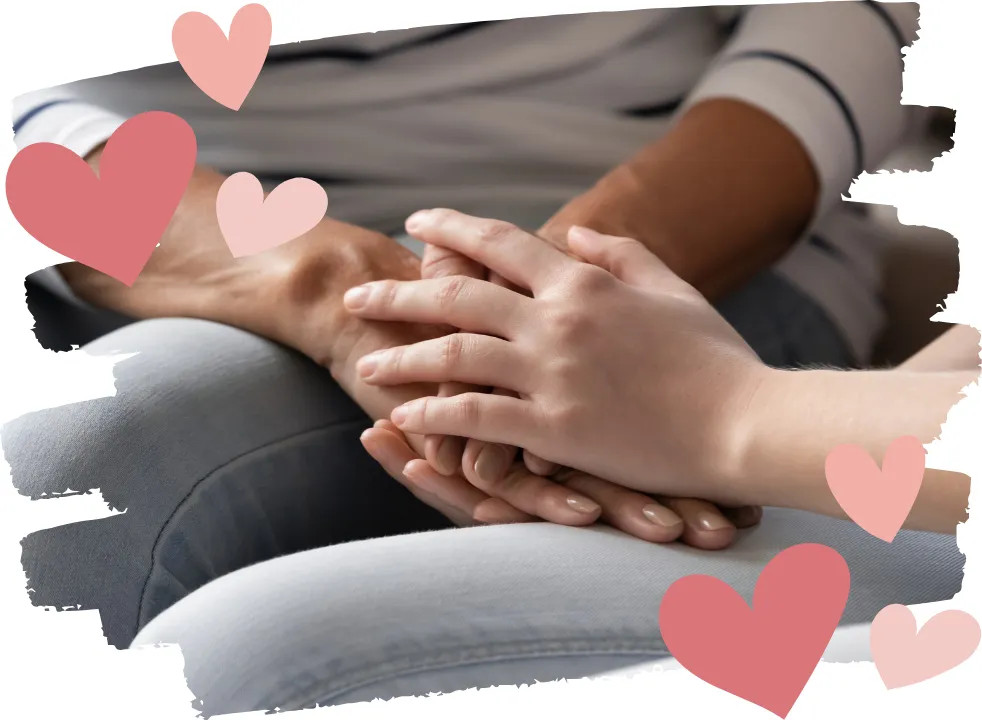The Blog
Physical Symptoms & Solutions
Welcome to the land of hot flashes, hair thinning, joint pain, bloating that makes you look six months pregnant—and yes, the stubborn weight gain that laughs in the face of your old diet tricks. This is where we break down the physical side of perimenopause with real solutions, hormone-savvy strategies, and a reminder that your body isn’t broken—it’s just asking for a new kind of care.

Tired, Wired, and Unheard: How Perimenopause Hijacks Sleep and Sanity
✨ Perimenopause Power Moves: 5 Simple Nutrition Shifts to Help You Feel Like Yourself Again! ✨
Grab your free guide today!
👉 Download Now!
Tired, Wired, and Unheard: How Perimenopause Hijacks Sleep and Sanity
"Empathy is a strange and powerful thing. There is no script. There is no right way or wrong way to do it. It's simply listening, holding space, withholding judgment, emotionally connecting, and communicating that incredibly healing message of 'You're not alone.'" Brené Brown, Daring Greatly: How the Courage to Be Vulnerable Transforms the Way We Live, Love, Parent, and Lead
Why Can’t I Sleep? Welcome to the 3 AM Club
Let’s be real—perimenopause and sleep struggles go together like hot flashes and sweat-stained sheets. One minute you're dreaming peacefully, the next you're wide awake, staring at the ceiling, wondering if anyone else is also Googling “why am I awake again?”
Blame hormones. As estrogen and progesterone do their erratic dance, melatonin production takes a hit, and your circadian rhythm goes a little haywire. Add anxiety into the mix—another “fun” side effect of fluctuating hormones—and it’s no wonder so many women over 40 are riding the insomnia train.
But here’s the thing: you’re not lazy, broken, or doing it wrong. You’re in perimenopause, and this is a normal (albeit exhausting) part of the journey.
What Even Is Perimenopause?
Perimenopause isn’t some mysterious myth cooked up by wellness influencers. It’s a legit biological transition that begins (on average) in your 40s, though some of us get an early invite in our 30s. Irregular periods, hot flashes, mood swings, anxiety, and—you guessed it—sleepless nights are part of the package.
Historically, it was menopause or nothing. You either had periods or didn’t. But as women’s health research evolved, so did the vocabulary. “Perimenopause” finally got its moment in the late 20th century, thanks to scientists and advocates demanding a deeper look at what’s really going on in our bodies.
And peri? It’s Greek for “around” or “near.” So basically, you're circling menopause—not quite there, not quite gone. A hormonal purgatory, if you will.
The Empathy Deficit: Why Support Matters
Some of my friends are breezing through perimenopause like they’ve got a backstage pass. Others (hi, it’s me) were hit like a freight train. The common thread? No one warned us.
There’s something powerful about hearing, “Me too.” Research backs it up: social support during perimenopause lowers anxiety and boosts emotional well-being. We weren’t meant to suffer in silence. And yet, many of us do—especially when conversations with family or older generations go sideways.
If you’ve ever gotten the “just deal with it” look from a parent or partner, you’re not alone. But we don’t have to buy into that old-school silence.
Hormones, Anxiety, and the Emotional Rollercoaster
Fluctuating estrogen messes with serotonin, that lovely little brain chemical responsible for mood regulation. When estrogen dips, serotonin dips, and suddenly you’re crying over a commercial or snapping at your spouse for breathing too loudly.
Add sleep deprivation to that and you’ve got a recipe for feeling totally unhinged.
You’re not being dramatic. You’re not “just emotional.” Your brain is responding to real biological changes. Understanding the why is the first step toward reclaiming your power.
The Sleeplessness Spiral: When Your Brain Won’t Shut Up
Here’s my truth: I work from home, which means I can sneak in a nap. But if I have plans the next day? Forget it. My brain spirals. What if I don’t sleep? What if I’m too tired to function?
Sound familiar?
The Sleep Foundation confirms that perimenopause messes with sleep cycles big time. Interrupted sleep, night sweats, and early morning wake-ups are par for the course. But that doesn’t mean we’re helpless.
Sleep Solutions That Actually Help
Same Bedtime, Every Night – Yes, even on weekends. Your hormones love routine.
Wind Down Like a Queen – Ditch the phone. Try a hot bath, gentle stretches, or meditation (try Insight Timer, it’s free and fabulous).
Say No to Nighttime Coffee and Wine – I know, I know. But both can hijack your sleep and mess with hormones.
Upgrade Your Sleep Sanctuary – Think cool, dark, quiet, and comfy. A supportive mattress and blackout curtains are game changers.
Smart Supplements – Magnesium glycinate, low-dose melatonin, or adaptogens like ashwagandha might help. Always check with your provider first.
When Talking About It Feels Hard (and It Often Does)
I'm heading out on a trip next month, and guess what? My sleep anxiety is already packing its bags. I’ve learned that while some people get it, others… not so much.
When you're dealing with parents from the “just suck it up” generation or friends who breeze through this phase, it can feel incredibly isolating.
Here’s how to gently nudge the conversation forward:
Educate with Empathy – Share that podcast or article (like this blog!) to bridge the knowledge gap.
Speak Up – “I’m going through something challenging and could really use your support” goes a long way.
Hold Boundaries – If someone keeps dismissing your experience? It’s okay to stop explaining.
Find Your Crew – Whether it’s online forums, local groups, or your bestie who gets it—surround yourself with validation.
Show Yourself Grace – Even when others don’t. Especially then.
Self-Care Isn’t Optional—It’s Survival
Here’s your permission slip to do what makes you feel good. Walks in nature. Lifting weights. Lying on the couch with a weighted blanket and a cup of magnesium tea. Laughing with friends. Saying no to things that drain you.
It all counts.
Perimenopause demands a different kind of care. One rooted in tuning into your needs, not tuning them out.
Final Thoughts: You Are Not Broken—You’re Becoming
Perimenopause is wild. It's unpredictable, uncomfortable, and occasionally infuriating. But it’s also a powerful reminder that we’re allowed to shift. To rest. To ask for support. To take up space.
So next time you’re wide awake at 3 AM, remember this: somewhere, another woman is too. You’re not alone in this. And you never have to be.
💫 Want support for your perimenopausal journey? Download my free guide: Tired of Hormonal Chaos? Take Back Control – filled with simple steps to feel like yourself again.
"Empathy is a strange and powerful thing. There is no script. There is no right way or wrong way to do it. It's simply listening, holding space, withholding judgment, emotionally connecting, and communicating that incredibly healing message of 'You're not alone.'" Brené Brown, Daring Greatly: How the Courage to Be Vulnerable Transforms the Way We Live, Love, Parent, and Lead
Why Can’t I Sleep? Welcome to the 3 AM Club
Let’s be real—perimenopause and sleep struggles go together like hot flashes and sweat-stained sheets. One minute you're dreaming peacefully, the next you're wide awake, staring at the ceiling, wondering if anyone else is also Googling “why am I awake again?”
Blame hormones. As estrogen and progesterone do their erratic dance, melatonin production takes a hit, and your circadian rhythm goes a little haywire. Add anxiety into the mix—another “fun” side effect of fluctuating hormones—and it’s no wonder so many women over 40 are riding the insomnia train.
But here’s the thing: you’re not lazy, broken, or doing it wrong. You’re in perimenopause, and this is a normal (albeit exhausting) part of the journey.
What Even Is Perimenopause?
Perimenopause isn’t some mysterious myth cooked up by wellness influencers. It’s a legit biological transition that begins (on average) in your 40s, though some of us get an early invite in our 30s. Irregular periods, hot flashes, mood swings, anxiety, and—you guessed it—sleepless nights are part of the package.
Historically, it was menopause or nothing. You either had periods or didn’t. But as women’s health research evolved, so did the vocabulary. “Perimenopause” finally got its moment in the late 20th century, thanks to scientists and advocates demanding a deeper look at what’s really going on in our bodies.
And peri? It’s Greek for “around” or “near.” So basically, you're circling menopause—not quite there, not quite gone. A hormonal purgatory, if you will.
The Empathy Deficit: Why Support Matters
Some of my friends are breezing through perimenopause like they’ve got a backstage pass. Others (hi, it’s me) were hit like a freight train. The common thread? No one warned us.
There’s something powerful about hearing, “Me too.” Research backs it up: social support during perimenopause lowers anxiety and boosts emotional well-being. We weren’t meant to suffer in silence. And yet, many of us do—especially when conversations with family or older generations go sideways.
If you’ve ever gotten the “just deal with it” look from a parent or partner, you’re not alone. But we don’t have to buy into that old-school silence.
Hormones, Anxiety, and the Emotional Rollercoaster
Fluctuating estrogen messes with serotonin, that lovely little brain chemical responsible for mood regulation. When estrogen dips, serotonin dips, and suddenly you’re crying over a commercial or snapping at your spouse for breathing too loudly.
Add sleep deprivation to that and you’ve got a recipe for feeling totally unhinged.
You’re not being dramatic. You’re not “just emotional.” Your brain is responding to real biological changes. Understanding the why is the first step toward reclaiming your power.
The Sleeplessness Spiral: When Your Brain Won’t Shut Up
Here’s my truth: I work from home, which means I can sneak in a nap. But if I have plans the next day? Forget it. My brain spirals. What if I don’t sleep? What if I’m too tired to function?
Sound familiar?
The Sleep Foundation confirms that perimenopause messes with sleep cycles big time. Interrupted sleep, night sweats, and early morning wake-ups are par for the course. But that doesn’t mean we’re helpless.
Sleep Solutions That Actually Help
Same Bedtime, Every Night – Yes, even on weekends. Your hormones love routine.
Wind Down Like a Queen – Ditch the phone. Try a hot bath, gentle stretches, or meditation (try Insight Timer, it’s free and fabulous).
Say No to Nighttime Coffee and Wine – I know, I know. But both can hijack your sleep and mess with hormones.
Upgrade Your Sleep Sanctuary – Think cool, dark, quiet, and comfy. A supportive mattress and blackout curtains are game changers.
Smart Supplements – Magnesium glycinate, low-dose melatonin, or adaptogens like ashwagandha might help. Always check with your provider first.
When Talking About It Feels Hard (and It Often Does)
I'm heading out on a trip next month, and guess what? My sleep anxiety is already packing its bags. I’ve learned that while some people get it, others… not so much.
When you're dealing with parents from the “just suck it up” generation or friends who breeze through this phase, it can feel incredibly isolating.
Here’s how to gently nudge the conversation forward:
Educate with Empathy – Share that podcast or article (like this blog!) to bridge the knowledge gap.
Speak Up – “I’m going through something challenging and could really use your support” goes a long way.
Hold Boundaries – If someone keeps dismissing your experience? It’s okay to stop explaining.
Find Your Crew – Whether it’s online forums, local groups, or your bestie who gets it—surround yourself with validation.
Show Yourself Grace – Even when others don’t. Especially then.
Self-Care Isn’t Optional—It’s Survival
Here’s your permission slip to do what makes you feel good. Walks in nature. Lifting weights. Lying on the couch with a weighted blanket and a cup of magnesium tea. Laughing with friends. Saying no to things that drain you.
It all counts.
Perimenopause demands a different kind of care. One rooted in tuning into your needs, not tuning them out.
Final Thoughts: You Are Not Broken—You’re Becoming
Perimenopause is wild. It's unpredictable, uncomfortable, and occasionally infuriating. But it’s also a powerful reminder that we’re allowed to shift. To rest. To ask for support. To take up space.
So next time you’re wide awake at 3 AM, remember this: somewhere, another woman is too. You’re not alone in this. And you never have to be.
Ready for science-backed solutions (and a little tough love)? Head over to Wide Awake and Hormonal: The Truth About Perimenopause and 3 AM Insomnia for a practical roadmap to better sleep.
💫 Want support for your perimenopausal journey? Download my free guide: Tired of Hormonal Chaos? Take Back Control – filled with simple steps to feel like yourself again.
Hormonally Yours,
Kimberlee Erin
Just a heads-up: I’m a Certified Menopause Coaching Specialist and Holistic Nutritionist, and while I love sharing what’s worked for me and my clients, this blog is for informational purposes only. It’s not a substitute for medical advice. Always check in with your healthcare provider before starting new supplements, hormones, or treatments—especially since every woman’s perimenopause journey is different. You deserve personalized care that truly fits you.
Free Download
Embracing Perimenopause: Tips and Tools for a Smooth Transition
Feeling overwhelmed by perimenopause? You’re not alone. Get my free guide, "Embracing Perimenopause: Tips and Tools for a Smooth Transition," and gain the confidence to manage your symptoms effectively.
Packed with practical advice and expert tips, this guide will help you balance your hormones, reduce stress, and improve your well-being.
Download your copy today and start your journey towards a smoother, more empowered transition.

